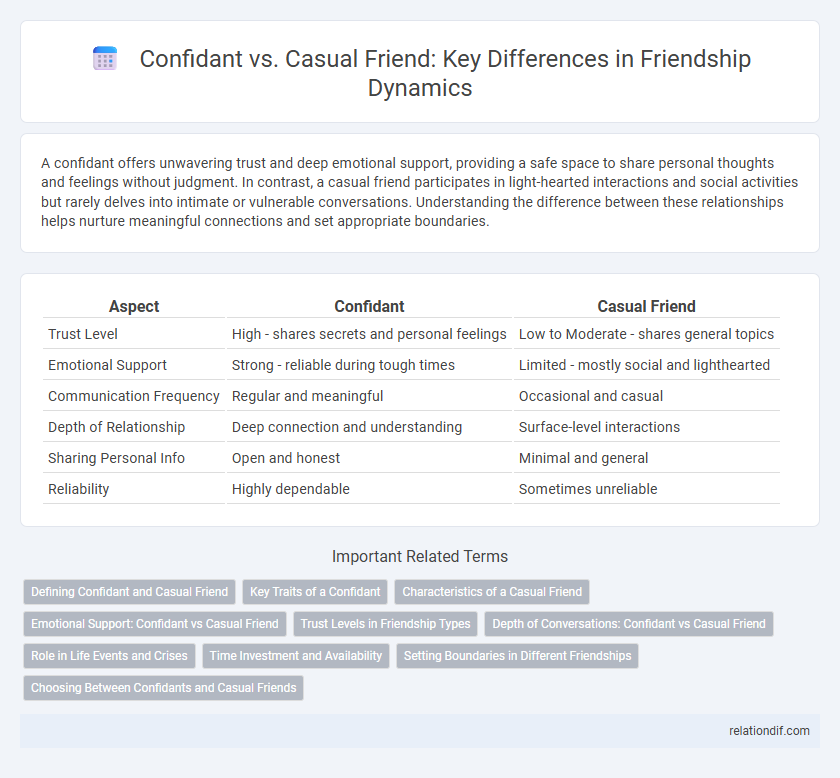A confidant offers unwavering trust and deep emotional support, providing a safe space to share personal thoughts and feelings without judgment. In contrast, a casual friend participates in light-hearted interactions and social activities but rarely delves into intimate or vulnerable conversations. Understanding the difference between these relationships helps nurture meaningful connections and set appropriate boundaries.
Table of Comparison
| Aspect | Confidant | Casual Friend |
|---|---|---|
| Trust Level | High - shares secrets and personal feelings | Low to Moderate - shares general topics |
| Emotional Support | Strong - reliable during tough times | Limited - mostly social and lighthearted |
| Communication Frequency | Regular and meaningful | Occasional and casual |
| Depth of Relationship | Deep connection and understanding | Surface-level interactions |
| Sharing Personal Info | Open and honest | Minimal and general |
| Reliability | Highly dependable | Sometimes unreliable |
Defining Confidant and Casual Friend
A confidant is a trusted individual with whom one shares personal thoughts, feelings, and secrets, ensuring emotional support and reliability. A casual friend, in contrast, engages primarily in light conversation and social activities without deeper emotional exchange or significant personal disclosure. Understanding these distinctions highlights the varying levels of intimacy and trust in different types of friendships.
Key Traits of a Confidant
A confidant is characterized by unwavering trust, deep emotional support, and the ability to maintain confidentiality, setting them apart from a casual friend who often shares lighter, surface-level interactions. Key traits of a confidant include empathy, active listening, and reliability, fostering a safe environment for vulnerability. This strong foundation enables meaningful, long-lasting connections essential for personal growth and emotional well-being.
Characteristics of a Casual Friend
Casual friends typically share common interests or social activities without deep emotional involvement or trust. Their interactions are often situational and limited to group settings, lacking the vulnerability and personal disclosures found in confidant relationships. These friendships offer companionship and social enjoyment but usually do not provide the support or intimacy necessary during personal challenges.
Emotional Support: Confidant vs Casual Friend
A confidant provides deep emotional support by actively listening, understanding vulnerabilities, and offering empathetic advice during difficult times. Casual friends typically share lighter interactions and social activities, offering limited emotional depth and less consistent support. The strength of emotional support in friendships is often measured by the level of trust and openness between individuals.
Trust Levels in Friendship Types
Trust levels in friendships vary significantly between a confidant and a casual friend, with confidants typically embodying deep emotional trust and reliability in sharing personal and sensitive information. Casual friends maintain a lighter level of trust, often limited to social interactions or situational support without extensive vulnerability. Understanding these distinctions aids in recognizing the appropriate boundaries and expectations within different friendship types.
Depth of Conversations: Confidant vs Casual Friend
Confidants engage in deep, meaningful conversations that reveal personal feelings, dreams, and fears, fostering trust and emotional intimacy. Casual friends typically share surface-level dialogue centered around daily activities, entertainment, or social events, maintaining a light and relaxed interaction. This depth of conversation fundamentally distinguishes the emotional bond and reliability found in a confidant compared to a casual friend.
Role in Life Events and Crises
Confidants play a crucial role during life events and crises by offering emotional support, trusted advice, and a safe space for vulnerability, strengthening the bond through shared understanding. Casual friends provide social enjoyment and light companionship but often lack the depth and reliability needed in challenging times. The distinction in their roles significantly impacts one's resilience and coping mechanisms during personal hardships.
Time Investment and Availability
A confidant requires significant time investment and consistent availability to build deep trust and emotional support, fostering a stronger and more meaningful connection. Casual friends typically involve limited time commitment and sporadic availability, making the relationship lighter and more flexible but less intimate. Prioritizing time and presence distinguishes a confidant from a casual friend in the dynamics of friendship.
Setting Boundaries in Different Friendships
Confidants require clear boundaries that protect vulnerability, ensuring mutual trust and emotional safety in deep conversations. Casual friends benefit from looser boundaries, centered on shared activities and light social interactions without the expectation of personal disclosures. Effective boundary-setting distinguishes emotional intimacy levels, maintaining respect and comfort in diverse friendship dynamics.
Choosing Between Confidants and Casual Friends
Choosing between confidants and casual friends depends on the level of trust and emotional support required, as confidants offer deep understanding and reliable discretion. Casual friends, while providing social interaction and companionship, lack the intimacy necessary for sharing personal challenges or vulnerabilities. Prioritizing confidants ensures a strong foundation for meaningful communication and emotional security.
confidant vs casual friend Infographic

 relationdif.com
relationdif.com